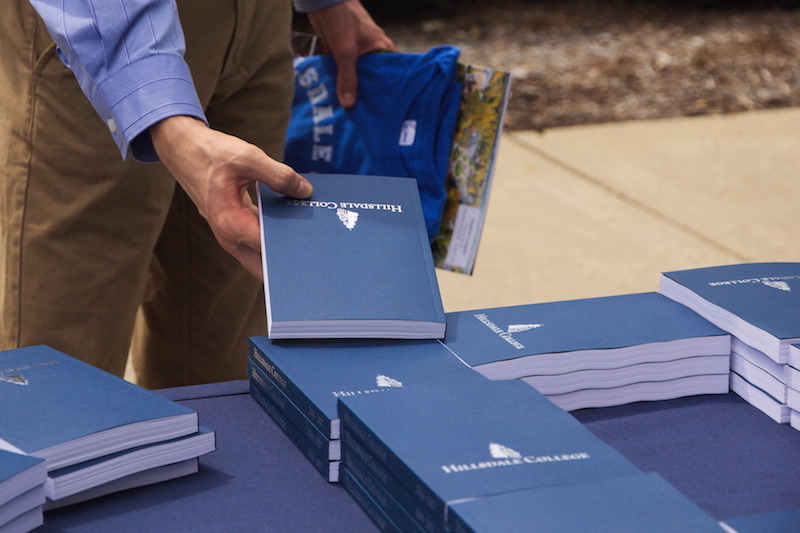
The core curriculum is one of the most distinctive features of Hillsdale College. Comprised of a whopping 55 credits, the core is double the size of a typical major. The amount and type of classes included are a source of debate on campus for students, but conversations surrounding the core actually started about 15 years ago.
Chairman of History Mark Kalthoff said the core as we know it today was first conceived in 2006, when a group of faculty, deans, and department chairs formed the President’s Core Curriculum Task Force at the direction of President Larry Arnn. Together, they decided on improvements and revisions that were implemented starting in 2010 and concluded just this year.
“The idea to revamp and expand the core emerged from numerous conversations between Dr. Arnn, faculty, and staff in the early years of his presidency,” Kalthoff said.
According to Kalthoff, the idea for a revamped core came when Arnn looked closely at the core and asked this question: “What do we at Hillsdale College believe is so important that anyone who would leave here with a degree must have been introduced to and be somewhat conversant in the subject matter?”
Establishing a set of subjects that everyone needs to know is just one of many things that makes Hillsdale unique, Kalthoff said, because many colleges and universities are unsure about this question.
“They’re unwilling to say that there’s anything that everyone needs to know,” he said. “Almost every college admissions counselor says, ‘Don’t worry, we don’t have any requirements. You can study whatever you want.’”
Kalthoff added that although the faculty voted to approve the new core, there was a lot of compromise involved throughout the process.
“The core curriculum does not look exactly like the curriculum any single faculty member would have drawn up if he or she were asked to draw it up,” he said.
Senior Phil Bernston, a history major, said his class was the first to take physics as part of the core.
“Should we even have these classes? All of us just got through high school science, which is the exact same thing that we do in college,” he said.
Although the core was implemented gradually over a 10-year period, Bernston’s class experienced rapid changes such as the addition of new classes like Classical Logic and Rhetoric. Current seniors were also the first class required to take both Western Philosophical Tradition and Western Theological Tradition, instead of choosing one or the other.
“They expanded the core by too much too fast, and it kind of blindsided people, especially my class who was coming in and didn’t know,” Bernston said. “People who want to do a double major are basically forced to take summer session classes.”
One common complaint among students is that the size of the core prevents them from specializing in more than one area. According to Kalthoff, however, the core is more important than any particular major in the long run.
“Not too long ago, in 2019, my phone rang and JP Morgan Chase was calling, saying that they were looking for people in the humanities,” Kalthoff said. “They said, ‘We can teach them the finance they might need to know, but we need people who can think, who can learn, who can communicate and who have a good work ethic and we know that people with a liberal-arts background can do it. We don’t care what they majored in.’”
Students can feel stressed about not having enough time to major in different areas because of cultural messages that tell them the liberal arts aren’t a practical option, according to Professor of History Thomas Conner.
“I think these pressures come from the fact that so many institutions of higher learning don’t have the same approach that we do,” Conner said. “I’ve heard some students in our own programs say that come graduation, if they’re still uncertain as to what they want to do, they find themselves envying the accounting majors who have jobs lined up months before commencement. There are a lot of cultural pressures that run counter to the whole approach we have here, and that’s something you have to contend with.”
Although the size of the core might seem inconvenient to some, Kalthoff emphasized that it was designed to make sure students learn certain essential lessons that are key to a successful life.
“What are the sources of personal order and political order? What is the right relationship between man and his maker?” Kalthoff said. “Those are big questions. If you get the answers right, you’ve got a chance to flourish as a human being. If you get the answers wrong, chaos, disorder, and misery result.”
Senior Reagan Cool, a philosophy and religion major, said core classes like chemistry actually helped her to understand the relationship between nature and God.
“We will all encounter frustrations with the core or various details of our education here,” she said. “This education, more than anything or anyone else in my life so far, has taught me to admit that I am young, I am often wrong, and there is much I do not know.”

